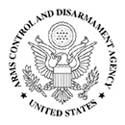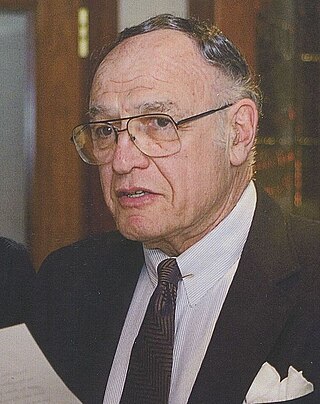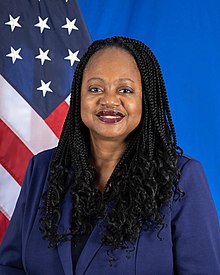
The Treaty on the Non-Proliferation of Nuclear Weapons, commonly known as the Non-Proliferation Treaty or NPT, is an international treaty whose objective is to prevent the spread of nuclear weapons and weapons technology, to promote cooperation in the peaceful uses of nuclear energy, and to further the goal of achieving nuclear disarmament and general and complete disarmament. Between 1965 and 1968, the treaty was negotiated by the Eighteen Nation Committee on Disarmament, a United Nations-sponsored organization based in Geneva, Switzerland.

The United States National Security Council (NSC) is the principal forum used by the president of the United States for consideration of national security, military, and foreign policy matters. Based in the White House, it is part of the Executive Office of the President of the United States, and composed of senior national security advisors and Cabinet officials.

Robert G. Joseph is a senior scholar at the National Institute for Public Policy and professor at Missouri State University. He was the United States Special Envoy for Nuclear Nonproliferation, with ambassadorial rank. Prior to this post, Joseph was the Under Secretary of State for Arms Control and International Security, a position he held until January 24, 2007. Joseph is known for being instrumental in creating the Proliferation Security Initiative and as the architect of the Global Initiative to Combat Nuclear Terrorism. He was also the US chief negotiator to Libya in 2003 who convinced the Libyans to give up their WMD programs. He also recently authored a book describing his experience in negotiating with Libya entitled "Countering WMD."
Assistant Secretary of State (A/S) is a title used for many executive positions in the United States Department of State, ranking below the under secretaries. A set of six assistant secretaries reporting to the under secretary for political affairs manage diplomatic missions within their designated geographic regions, plus one assistant secretary dealing with international organizations and one equivalent as the coordinator/ambassador at large for counterterrorism. Assistant secretaries usually manage individual bureaus of the Department of State. When the manager of a bureau or another agency holds a title other than assistant secretary, such as "director," it can be said to be of "assistant secretary equivalent rank." Assistant secretaries typically have a set of deputies, referred to as deputy assistant secretaries (DAS).

The U.S. Arms Control and Disarmament Agency (ACDA) was an independent agency of the United States government that existed from 1961 to 1999. Its mission was to strengthen United States national security by "formulating, advocating, negotiating, implementing and verifying effective arms control, nonproliferation, and disarmament policies, strategies, and agreements."

The Bureau of Political-Military Affairs (PM) is an agency within the United States Department of State that bridges the Department of State with the Department of Defense. It provides policy in the areas of international security, security assistance, military operations, defense strategy and policy, military use of space, and defense trade. It is headed by the Assistant Secretary of State for Political-Military Affairs.

The Bureau of International Security and Nonproliferation (ISN) is a bureau within the United States Department of State responsible for managing a broad range of nonproliferation and counterproliferation functions. The bureau leads U.S. efforts to prevent the spread of weapons of mass destruction, their delivery systems, advanced conventional weapons, and related materials, technologies, and expertise.

The Assistant Secretary of State for Arms Control, Verification and Compliance is the head of the Bureau of Arms Control, Verification and Compliance. The position was created on December 12, 1999, by Secretary Albright as the Assistant Secretary of State for Verification and Compliance. The Bureau became fully operational on February 1, 2000, and was first known as the Verification and Compliance Bureau. Within the department, the Assistant Secretary is responsible for all matters relating to the supervision of verification and compliance with international arms control, nonproliferation, and disarmament agreements. The bureau was given its current name during the Obama administration.

Rose Eilene Gottemoeller is an American diplomat who served as Deputy Secretary General of NATO from October 2016 to October 2019 under Secretary General Jens Stoltenberg. Before then she was the Under Secretary of State for Arms Control and International Security at the U.S. State Department.

Paula Adamo DeSutter was United States Assistant Secretary of State for Verification, Compliance, and Implementation from 2002 to 2009.

Christopher Ashley Ford is an American lawyer and government official who served from January 2018 until January 2021 as Assistant Secretary of State for International Security and Non-Proliferation. He was nominated to that position by President Donald Trump, and confirmed unanimously by the U.S. Senate on December 21, 2017. After October 21, 2019, Ford also, by delegation from Secretary of State Michael Pompeo, performed the duties of the Under Secretary of State for Arms Control and International Security until his resignation from the Department of State on January 8, 2021.

Ambassador Ronald Frank Lehman II is currently Director of the Center for Global Security Research at the United States Department of Energy's Lawrence Livermore National Laboratory. He is also Chair of the Governing Board of International Science and Technology Center, an intergovernmental organization headquartered in Moscow and is a member of the Department of Defense Threat Reduction Advisory Committee.

The Bureau of Arms Control, Verification and Compliance (AVC) is a bureau within the United States Department of State. It is responsible for providing oversight of policy and resources of all matters relating to the verification of compliance, or discovery of noncompliance, with international arms control, nonproliferation, and disarmament agreements.
Thomas Graham Jr. is a former senior U.S. diplomat. Graham was involved in the negotiation of every single international arms control and non-proliferation agreement from 1970 to 1997. This includes the Strategic Arms Limitation Talks, the Strategic Arms Reduction Treaties, the Anti-ballistic missile (ABM) Treaty, Intermediate-Range Nuclear Forces Treaty (INF) Treaty, Treaty on the Non-Proliferation of Nuclear Weapons Treaty (NPT), Treaty on Conventional Armed Forces in Europe (CFE) Treaty and Comprehensive Nuclear-Test-Ban Treaty (CTBT). In 1993, Ambassador Graham served as acting director of the Arms Control and Disarmament Agency (ACDA) from January to November, 1993 and Acting Deputy Director from November, 1993 to July, 1994. From 1994 through 1997, he was president Bill Clinton's special representative for Arms Control, Non-Proliferation, and Disarmament. Graham successfully led the U.S. government efforts to achieve the permanent extension of the NPT in 1995. Graham also served for 15 years as the general counsel of ACDA. Throughout his career, Thomas Graham has worked with six U.S. Presidents including Presidents Richard Nixon, Gerald Ford, Jimmy Carter, Ronald Reagan, George H. W. Bush, and Bill Clinton. Ambassador Graham worked on the negotiation of the Chemical Weapons Convention and the Biological Weapons Convention and managed the Senate approval of the ratification of the Geneva Protocol banning the use of chemical and biological weapons in war, as well as the Biological Weapons Convention.

Bonnie Denise Jenkins is an expert on arms control and nonproliferation of weapons of mass destruction and currently serves as the under secretary of state for arms control and international security affairs. During the Obama administration, she was the U.S. Department of State's coordinator for threat reduction programs in the Bureau of International Security and Nonproliferation.

Thomas Johannes Hirschfeld was a United States Foreign Service Officer and State Department official who served as Deputy Assistant Director of the Arms Control and Disarmament Agency in the Carter administration. In 1979, he became the Deputy Head (Minister) of the Mutual and Balanced Force Reductions delegation negotiating troop withdrawals from Europe between NATO and the Warsaw Pact states in Vienna, Austria, and was appointed acting head in 1981.

Anita E. Friedt is an American diplomat.

C.S. Eliot Kang is an American diplomat and member of the Senior Executive Service. He currently serves as the Assistant Secretary for the Bureau of International Security and Nonproliferation (ISN) at the U.S. Department of State. From January to July 2021 and January 2017 to January 2018, Kang served as acting ISN Assistant Secretary and also exercised the authority of the Under Secretary of State for Arms Control and International Security Affairs. He also served as acting ISN Assistant Secretary from January to June 2009.

Yleem D.S. Poblete is a former American government official who served as the United States Assistant Secretary of State for Verification, Compliance, and Implementation from April 30, 2018 to June 7, 2019. Dr. Poblete previously served as the Chief of Staff of the House Foreign Affairs Committee, a committee on which she worked for close to 20 years.

Bruce I. Turner is an American diplomat who is the U.S. representative to the Conference on Disarmament, with the rank of Ambassador.

















